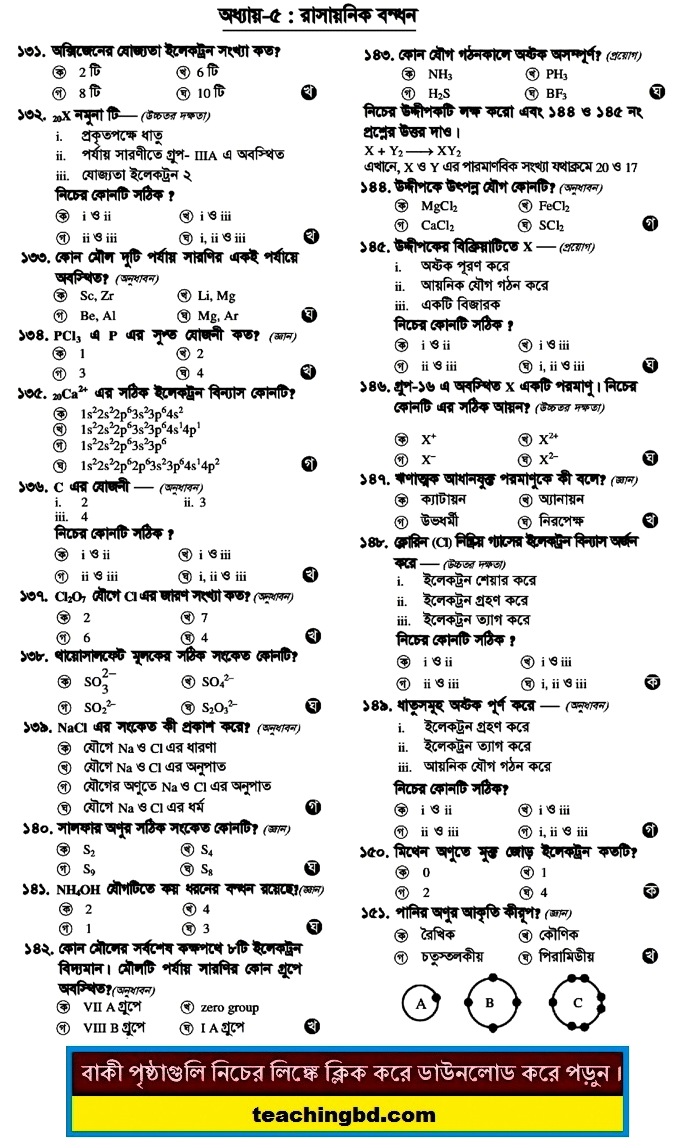SSC MCQ Question Ans. Chemical Bonds
SSC MCQ Question Ans. Chemical Bonds. Inert gases are stable in nature as mono-atomic gases, except these gases the atoms of other elements cannot exist independently in nature. Molecules of fundamental gases are di-atomic like O2, N2, F2, Cl2, Br2, etc. Again molecules of some elements consist of more than two atoms. For example O3, P4, S8. Again, compounds are formed by the combination of atoms of different elements like NaCl, H2O, HCl, CH4, etc. In all molecules atoms remain attached together by a special kind of attraction force; this force is called the binding force.
SSC MCQ Question Ans. Chemical Bonds

Generally, at the bond formation, every atom wants to achieve the electronic configuration of its nearest inert gas at its last energy level. Generally metal and nonmetal form ionic bonds while nonmetal and nonmetal form a covalent bond. In metallic pieces metal atoms attached with one another by the metallic bond. The elements or compounds formed by three types of bonds have unique characteristics of.
Molecular geometry, also known as the molecular structure, is the three-dimensional structure or arrangement of atoms in a molecule. Understanding the molecular structure of a compound can help determine the polarity, reactivity, phase of matter, color, magnetism, as well as the biological activity.
Chemistry is the scientific discipline involved with elements and compounds composed of atoms, molecules, and ions: their composition, structure, properties, behavior and the changes they undergo during a reaction with other substances.
Chemistry is a branch of science that involves the study of the composition, structure, and properties of matter. Often known as the central science, it is a creative discipline chiefly concerned with atomic and molecular structure and its change, for instance through chemical reactions.
The days are long past when one person could hope to have detailed knowledge of all areas of chemistry. Those pursuing their interests into specific areas of chemistry communicate with others who share the same interests. Over time a group of chemists with specialized research interests becomes the founding members of an area of specialization.
The areas of specialization that emerged early in the history of chemistry, such as organic, inorganic, physical, analytical, and industrial chemistry, along with biochemistry, remain of greatest general interest. There has been, however, much growth in the areas of polymer, environmental, and medicinal chemistry during the 20th century. Moreover, new specialties continue to appear, as, for example, pesticide, forensic, and computational chemistry.
This course provides students with the opportunity to develop their knowledge, understanding, and skills in relation to properties and structures of matter and a variety of chemical reactions incorporating organic compounds and acid/base equilibrium reactions.
Chemistry is one of the diverse branches of physical science. It is known as the science of life. The practice of chemistry has been in a constant increase since the ancient time. The present-day chemical industries have been evolved from the early practices of the Alchemists. Chemistry as a discipline encompasses a wide range of areas. It has always been devoted to the welfare of human and its environment.
teachingbd24.com is such a website where you would get all kinds of necessary information regarding educational notes, suggestions and questions’ patterns of school, college, and madrasahs. Particularly you will get here special notes of physics that will be immensely useful to both students and teachers. The builder of the website is Mr. Md. Shah Jamal Who has been serving for 30 years as an Asst. Professor of BAF Shaheen College. He expects that this website will meet up all the needs of Bengali version learners /students. He has requested concerned both students and teachers to spread this website home and abroad.


